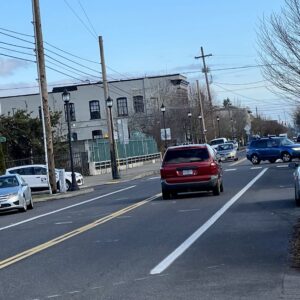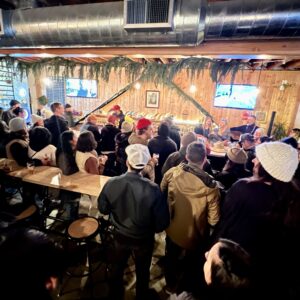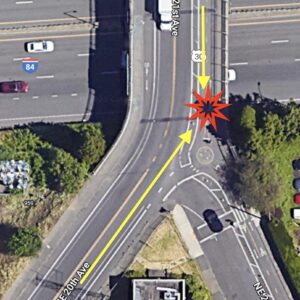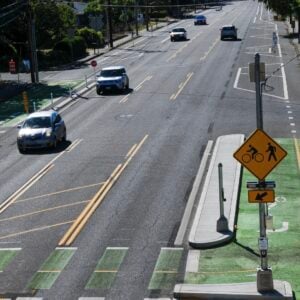
charged with a felony.]
A press release from the Washington County Sheriff’s Department credits “leads provided by citizens” in helping them locate the truck and boat trailer of Newberg resident John Carothers (right).
Carothers—the man behind a hit and run on Highway 219 last Saturday—has been charged with a felony for fleeing the scene of the crime.
Here’s an excerpt from the press release:
“Washington County Deputies and Washington County Detectives were able to complete their investigation with leads provided by citizens to help locate the truck and boat trailer and identify Carothers as the suspected driver of the truck.
Carothers was contacted by deputies and surrendered himself to the Washington County Sheriff’s Office at about 2:00pm today. Carothers is being held in the Washington County jail on $20,000 bail.
This is a good example of how important citizen involvement can be to assist the Washington County Sheriff’s Office in solving crimes.“
A big thank you goes out to everyone who spread the word about this incident.







Thanks for reading.
BikePortland has served this community with independent community journalism since 2005. We rely on subscriptions from readers like you to survive. Your financial support is vital in keeping this valuable resource alive and well.
Please subscribe today to strengthen and expand our work.
WIth this arrest and the suspect in Vancouver identified – I think someone should send the respective police agencies a gold plated chainring. Something that looks like a old western badge, to say thanks from the cycling world.
I don’t know if BikePortland.org played a direct roll in tracking down this or other hit and run drivers but I would like to thank Jonathan for spreading the word about these incidents. I know some people whos lives would be much different if there had been a network to get the word out about accidents like these in the past.
Jonathan, thank you for the good news. With Garrett’s hit-and-run killer going to prison and the two hit-and-run drivers caught today, it’s a comforting thought that sometimes the police really are there “to protect and to serve”. A big thank you to them and everyone else who helped.
A Felony Hit and Run is not sufficient given the facts (that I am aware of) and actions and involvement of the passenger. The vehicle fit the ORS definition of a dangerous weapon. This is a Measure 11 Assault. I would encourage calls to the DA’s office to ensure the appropriate charges are filed and this is not just categorized as simply “leaving the scene of an accident in which someone is injured.” There is a big difference.
Seconding Cate – hear, hear!
Great job, everyone who was involved – great to hear that some of these drivers are getting caught and prosecuted.
I second Gary on that one. When a vehicle is used as a weapon, it is a completely different crime.
i love all these posts where all the sudden everyone is a lawyer. the guy will pay, there are people who get paid to take care of that and they go to school for a long time and spend lots of money on it and they are called lawyers, some good, some bad but they know the laws and i don’t think someone on a blog will point them in the right direction. CONGRATS on catching this scum bag
thanks for the love joe
The cops deserve a pat on the back for finding this scumbag. It is refreshing to see our public servants actually serving the public instead of giving cyclists tickets for minor traffic infractions.
The county commissioners or whoever is responsible for allowing the highway to be paved only to the white line and no farther deserve to be bull-whipped, just like Clint Eastwood did to the bad guys in “Hight Plains Drifter.” See the movie and see for yourself what MANY of our elected officials deserve.
A few more inches of pavement beyond the white line might have prevented this incident (unless it was intentional, which is probable in this case).
To prevent nightmares, I will not write what the scumbag deserves.
😉
While it is very sad that people have been hurt and killed recently, the media coverage of arrests and charges is going to help create safer roads long term. When I was living in California nearly two decades ago, similar prosecutions and an burgeoning legal industry specializing in cyclist / pedestrian injury claims led to much better driver awareness. In fact, pedestrians and cyclists are damned near sacred these days in parts of SoCal.
Keep up the good work, Jonathan. Let’s all keep pressure on the local media to keep reporting these stories and their outcomes.
“The county commissioners or whoever is responsible for allowing the highway to be paved only to the white line and no farther deserve to be bull-whipped…”
Someone’s testosterone is in overdrive, but it does raise a good issue.
I wish someone would explain why the counties and cities don’t pave the two lane roads wider. I talked to the guy who’s responsible for bicycling issues in Washington County (I forget his name, but I think he’s Roger Geller’s counterpart in Wash Cty) about this last year. He said they want to, but when they did a survey of county roads (not city roads), only 10% would work (pave wide enough to add bike lanes).
I brought the same idea up with Roger Geller at PDOT about two lane roads in SW Portland last year, but never got a response. The City has done it already on SW Multnomah Blvd, but I don’t know why they don’t do it on similar streets.
It would be a huge improvement in Southwest Portland and Washington County, the land of two lane roads where bicyclists often must ride in traffic (in this case, “share the road” isn’t a safe proposition).
In many cases the city or county already has right-of-way land to use, so something else apparently is stopping them from taking such a simple, relatively inexpensive step.
Sorry, Jonathan, once again I’ve ventured off topic. 🙂
The county commissioners do not need to provide “bike lanes”. All they need to do is put down a few inches of pavement beyond the white line.
“Joe’s” simplistic complaint above ignores the fact that there are plenty of so-called professionals who need prodding to do their jobs instead of take the expedient path. A couple calls to the DA’s office may well tip the balance. Sorry to upset joe’s tidy world view, but like it or not this is the way things actually work in the real world.
His post only reminds us that there are a lot of people like him who trust blindly in others’ “expertise” and expect them to take care of things. Thank god for the activists and others with spines, opinions and motivation who actually get things done.
Hi Cate,
Sorry you didn’t get a response from me…
This question comes up often and the simple answer is that widening the road is not a simple matter of just putting down some additional asphalt on top of the (unpaved) shoulders. Whever there is asphalt there are going to be motorists driving on it (even if it’s striped as a bike lane or shoulder). There will be people parking, cars pulling in and out of driveways, trucks too wide or drivers too inaccurate to stay in the travel lane, garbage trucks etc. Because of this we need to build that section of the roadway the same as we build all sections. The 2″ of asphalt you see on top of the roadway has an additional 6″ of asphalt underneath it, and between 8-12 additional inches of aggregate underneath that. In addition, whenever we add more than 500 sq ft of new impervious surface (i.e., roadway or sidewalk that doesn’t directly drain to the soil underneath) we need to make sure we either provide drainage and/or treatment for the run-off. This is much more work and much more money than simply pouring out an additional 2″ of asphalt, which is what we do in a typical overlay. If we don’t construct the roadway base, then that section of the road is just going to start falling apart within a couple of years. Generally, we want our roads to last about 18 years, or so.
So, what it really comes down to is a matter of available budget. We just don’t have the money to widen roadways as part of routine maintenance.
Roger Geller
Roger,
Thank you for your response. I question whether you really need to make the shoulder of the road the same quality as the regular traffic lanes. The wear and tear is much less. And I thought the roads were repaved every seven years. Why does it need to last 18 years?
The money doesn’t need to come from your routine maintenance budget. The money needs to come from the budget you use for making streets safer for bicyclists. The City has money for that.
Cate – With several years working for a bituminous QA firm, I have to echo Roger’s points, it’s just not that easy or cheap to widen a road even just a couple of feet. Without several layers of asphalt and propper grading below, the lane would deteriorate quickly even if cars didn’t ride/park on it. And repaving usually just grades the top layer, keeping the work below.
However, I agree – there needs to more money budgeted for improving streets for bicycles – widening lanes in places, fixing bad intersections, establishing better bike blvds, etc.!
Brock, thank you. I even got to learn a new work – bituminous.
I know nothing about aspalt or making streets. What I do know is the City has spent decades saying “we can’t do anything, we can’t do anything”. The one exception I know of is they did widen the road enough for bike lanes on SW Multnomah Blvd. They did it once, but they can’t do it again?
If I didn’t see the City spending money elsewhere for improvements, I’d agree that the City doesn’t have any money to do it. But that isn’t the case. (How much were those new bike bridges over McLoughlin in Sellwood?)
I was supposed to be on that ride that ended with this a-hole hitting my friend. I am very happy that this guy has been caught. The police are still pursuing the man that threw (actually spit) water on the victim just prior to her getting struck. He apparently has had previous run-ins with the law.
p.s. she is home and healing.
Portland and the state of Oregon in general claim they are “bike friendly”. There is a big push to make biking in Oregon a destination for tourists. What kind of positive message would be created if all new roads (and newly paved roads) have 3 foot shoulders? Yes, it costs money, but so does everything. What would it take to get this done? It would make biking safer for bikers AND those in automobiles. I am sure bikers and non-bikers would support this. Let’s create an effort to get this done, to make it a STANDARD for all Oregon roads. What a wonderful thing that would be.
Outstanding! Good to see Portland has such a community of Cyclists….it’s rapidly finalizing any questions as to whether I move there after College!